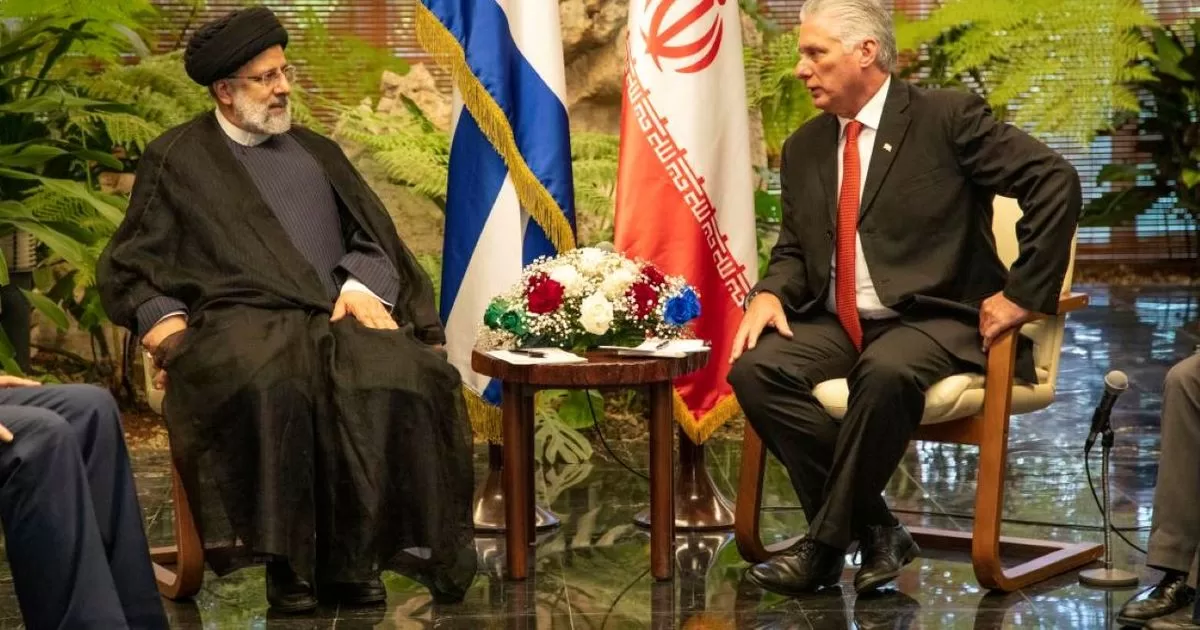The article highlights the four high-level meetings between Cuban and Iranian officials. Díaz-Canel’s visit to Iran on December 4 was “the first in 22 years that a Cuban leader has visited Iran since Fidel Castro went to Tehran in 2001.”
Iranian President Ebrahim Raisi visited Cuba in June, and Foreign Minister Hossein Amir-Abdollahian visited in February. The leaders also met during the UN General Assembly in September.
However, this economic approach ignores broader issues of National Security.
In his novel “The Ground Beneath Their Feet,” author Salman Rushdie observes that “the only people who see the full picture are those who step outside the frame.”
In addition to Cuba, the Iranian president visited Venezuela and Nicaragua in June. If the issue was forging an economic alliance between countries sanctioned by Washington, Venezuela and Cuba would make sense, but Nicaragua has a free trade agreement with the United States. What do they have in common Nicaragua, Venezuela y Cuba? They are dictatorships hostile to the United States and the existing world order. Nicaragua has purchased Russian war tanks, allows a Russian military base on its territory and, like Cuba, supports Putin’s illegal war against Ukraine on diplomatic and propaganda fronts.
We must also listen to what they are saying.
In Venezuela, according to The Jerusalem Postthe president of Iran Raisi met with Nicolás Maduro and “ spoke of the need to confront the United States, and overthrow the US-led world order that has existed since the end of the Cold War.” In Nicaragua, he repeated the themes of “the resistance of the people contributes to the change of the world order” and “ending the hegemonic projects of the United States.”
Nicaraguan dictator Daniel Ortega and his wife, Vice President Rosario Murillo, welcomed President Raisi and first lady Jamileh-Sadat Alamolhoda in the Non-Aligned Plaza in Managua, where Ortega recalled that Nicaragua and Iran have “revolutions “twins” that both triumphed in 1979 and that they are united in the effort against empires and their arbitrary sanctions.
Iran and Cuba are state sponsors of terrorismand the tactics of their respective intelligence agencies have been applied against dissidents in Nicaragua and Venezuela to consolidate both dictatorships.
Cuban soldiers They train in Belarus and they fight in Russian uniforms on the front lines in Ukraine. Moscow uses Iranian drones against Ukrainian targets.
Furthermore, China is expanding its espionage capabilities against the United States using bases in Cuba.
The current international system, governed by democracies since 1945, has an alternative that challenges it, led by Beijing, Moscow and Tehranwith allies in Havana, Caracas and Managua.
The Cuban intelligence service has historically shared and sold information to enemies of the United States. The cases of those accused of being secret agents like the Ambassador Manuel Rochawho had access to the National Security Council, Ana Belen Montes at the Pentagon at the Defense Intelligence Agency, Walter Kendall Myers in the State Department and others who have worked for the Castro regime’s intelligence directorate and passed secret information to America’s enemies in Beijing, Moscow and Tehran, have shaped US policy against American interests. , taking lives and resources.
Cuba e Iran have a long relationship with the terrorist groups Hamas and Hezbollah, and decades of hostility against Israel, a country allied to the United States in the Middle East. Since October 7, Iran and Cuba have publicly supported Hamas and have refused to condemn their terrorist attacks against Israel. Hamas too receives support from Beijing and Moscow.
First Ukraine, then Israel. What will be the next democracy allied to the United States to be attacked?
The overall picture is disturbing, but it needs to be recognized and countered to defend democracy and human rights.
John Suarez is Executive Director of the Center for a Free Cuba.

